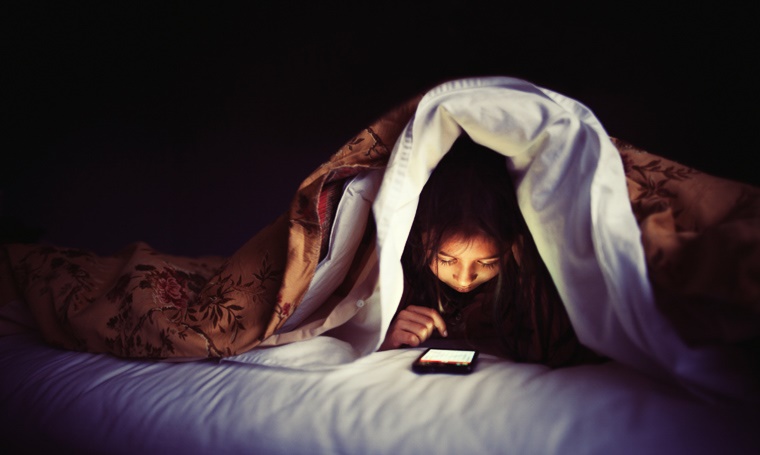
I know you don’t want to believe it, but it’s true. While technology has improved our lives in countless ways, one of the ways in which it has become detrimental to us is how it affects both our quality and quantity of sleep. Read on to find out the three ways in which your devices might be having a negative impact on your sleep, and what you can do about it. And yes, some of the solutions ironically enough require – you guessed it – technology.
1) Devices give off a light that suppresses melatonin, a sleep-inducing hormone.
Chances are you’ve heard of melatonin, a supplement some people take before bedtime to help them sleep. What some people don’t realize is that melatonin is naturally produced by our bodies. Along with its wake-inducing counterpart cortisol, these two hormones are produced by our bodies to assist with waking up and going to sleep. How does our body know when to produce which hormone? Simple: daylight and darkness. The light that devices emit can actually trick our bodies into thinking it’s still daytime, affecting our melatonin and cortisol production. According to a 2015 study at The Lighting Research Center, using your device for two hours before bedtime can decrease your melatonin production by as much as 23%.
So what can I do about it?
Assuming that not using any of your devices after sunset might be a stretch, try using a “blue light blocking” app. These apps help to reduce the negative impact that blue light has on our bodies at night by replacing it with a warm, amber hue instead. iPhone models 6 and later have a built-in tool that accomplishes this called Night Shift (find it at Settings –> Display & Brightness –> Night Shift). The most popular blue light blocking app available for desktop computers and devices alike is Flux. If you can’t get your hands on a blue light blocking app, try at least turn your brightness down to its lowest setting.
2) Devices are stimulating, both mentally and physically.
Blue light aside, it’s often the content on your device that can keep the gears in your head moving long after you’ve shut off the lights. As you’re reading emails or scanning your Facebook feed, your brain is stepping on the gas pedal, electric activity is increasing, and neurons are speeding up – the reverse of what should be happening right before you go to sleep.
So what can I do about it?
A general recommendation is to stop using devices two hours before bedtime. Never gonna happen? Do what you can, even if it’s just thirty minutes. A ritual some people may find helpful is to do something that doesn’t involve your device for a half-hour before bed, such as reading a book or writing in a journal.
3) Using our devices in bed reinforces the idea that the bed is a place for waking activities, and not for sleep.
Engaging in non-sleep activities in bed such as watching TV, playing games, or working, can be bad for your sleep quality. This is because the more activities your brain associates with your bed other than sleeping, the less it will think about sleep when you’re in bed.
So what can I do about it?
Try reserving the time you spend in bed for sleep and other activities that enhance restfulness rather than detract from it. Additionally, you could also plug your device into an outlet in the next room and try using an actual alarm clock for a change.
In conclusion, remember that these tips are meant to help those who feel they could be sleeping better. If you’re checking emails in bed until 2 am every night and then sleeping like a baby for eight hours straight with no problem, power to you! But if you’re someone who finds your mind racing as you’re trying to fall asleep at night (and you’re not alone), one of these strategies could very well give you some relief.


Pingback: 3 Things Dogs Can Teach Us As Business Owners - Ellanyze 2024
Pingback: 3 Things Dogs Can Teach Business Owners (or AnyBody!) - Ellanyze 2024